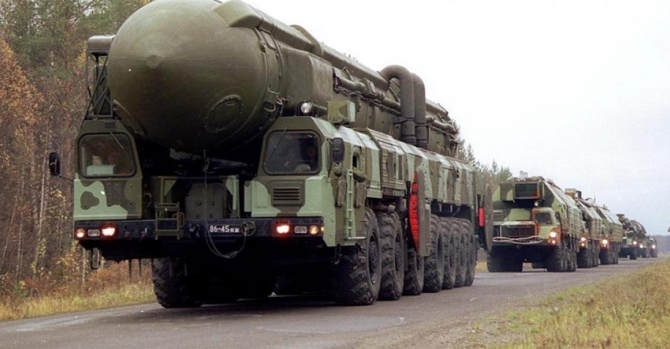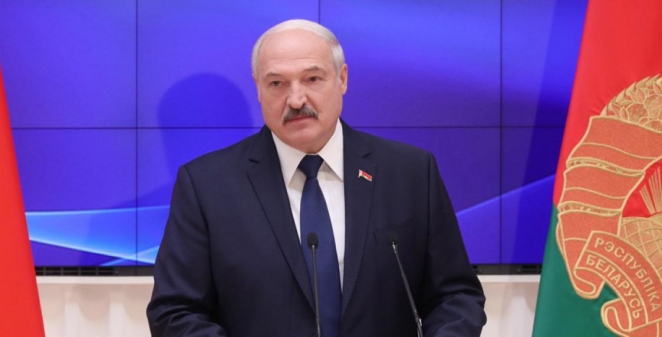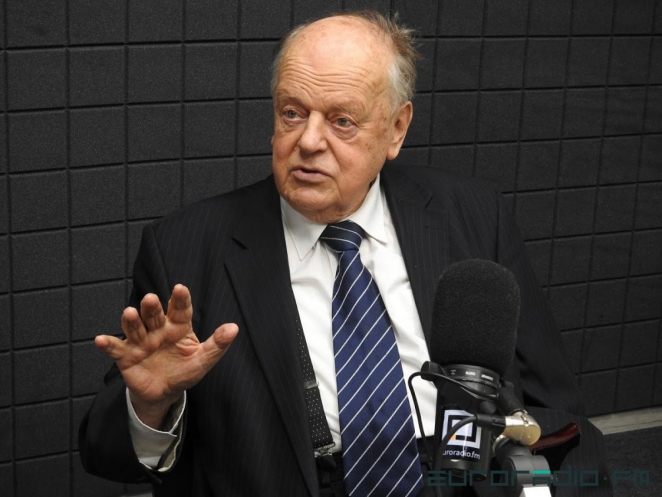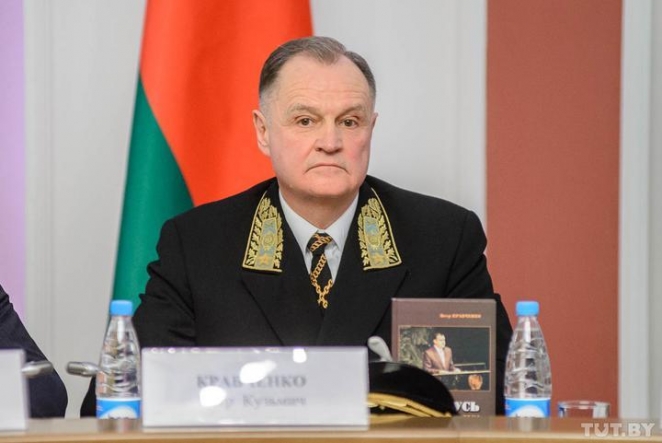Cost of withdrawing nuclear weapons from Belarus explained
MARYIA VAITOVICH, PAVEL SVIARDLOU, Euroradio
24 March 2020, 12:30
 Fifty years ago, the Treaty on the Non-Proliferation of Nuclear Weapons entered into force. In July 1993, Belarus became the first state which voluntarily, "without any preconditions and reservations", renounced the nuclear potential left in the country after the collapse of the USSR. The withdrawal of nuclear weapons from the territory of our country was completed by the end of 1996.
Fifty years ago, the Treaty on the Non-Proliferation of Nuclear Weapons entered into force. In July 1993, Belarus became the first state which voluntarily, "without any preconditions and reservations", renounced the nuclear potential left in the country after the collapse of the USSR. The withdrawal of nuclear weapons from the territory of our country was completed by the end of 1996.
Absolutely free of charge
Alyaksandr Lukashenka considers the withdrawal of nuclear weapons from Belarus a mistake. He blames it on the former leadership of the country, which parted with missiles without any compensation -- unlike Ukraine and Kazakhstan.
"I believe that the withdrawal of nuclear weapons from Belarus under the conditions agreed by our nationalists was the most awful mistake," he said in 2010. "I had to sign this treaty because I was backed into a corner: both Russia and the Americans were pushing me to withdraw because we had promised to. We shouldn't have, it's the greatest asset, it's an expensive commodity that we at the very least were supposed to sell decently".
"I regret it very much -- withdrawal of nuclear weapons from Belarus," continues Lukashenka four years later at a meeting with Russian journalists. "We did it absolutely for free. Yes, I had to follow the agreements made before me, it is obligatory. But I think that in that mess, in what was then, no one would have put excessive pressure on me ...".
Price negotiation was appropriate
So Belarus could have kept the missiles? Or couldn't it, but it gave them off cheaper than it could? The first head of independent Belarus Stanislau Shushkevich is convinced that only those who do not understand what it is can talk about the keeping nuclear weapons in Belarus.
"Remember Ilf and Petrov's phrase "The price negotiation is inappropriate here". It's very dangerous to make jokes with such weapons. It threatened Belarus and the Belarusian nation. We had missile systens that could potentially destroy all of Europe".
However, some improvised bargaining took place in the early 1990s.
"I was in the U.S., and here I met with lawyers," recalls Stanislau Shushkevich. "They were discussing the program, saying how we could also get something, because we didn't even have to be persuaded to withdraw the weapons. We understood everything perfectly well... American lawyers were given 24 hours to solve this issue. At first the amount of compensation was less, but after my trip to the U.S., we stopped at 59 million dollars".
Who gives more?
Fifty-nine million dollars is at least not free. But the portal 90s.by about Belarus of the 1990s, referring to the memories of former Foreign Minister of Belarus Piotr Krauchanka, claims the figure is $100 million more.
In January 1992, Belarus announced that it would not only fulfill all its obligations, but also accelerate the withdrawal of tactical nuclear weapons from the country. This became a trump card in negotiations with the Americans who, in spring of the same year, extended the Nunn-Lugar Cooperative Threat Reduction Program to our country [The Program under which the US helped the countries of the former USSR to dispose of nuclear, chemical and biological weapons -- Euroradio]. It provided $250 million for nuclear safety purposes during the dismantling, redeployment and destruction of nuclear warheads. Belarus received more than 100 million dollars. It should be noted that later, in 1993, during the visit of the Belarusian delegation headed by Stanislau Shushkevich to the United States, Belarus received another $59 million.
However, Shushkevich believes that there was a mistake in this text, and insists on the figure of $59 million that he described.
Was there anything to compensate for?
Alexander Baichorau is now a professor at the Department of International Relations of the Belarusian State University. In the 1990s, he headed the Department of International Security and Arms Control of the Foreign Ministry. According to him, before talking about the fact that Belarus hasn't received compensation for the withdrawal of nuclear weapons, it's worth remembering that the nuclear systems in our country were not dismantled.
"There's a lot of talk about the fact that everyone received compensation, while the Republic of Belarus didn't. But to be honest, the nuclear systems were not dismantled on our territory," said Baichorau, speaking at an event of the Foreign Ministry on March 5 on the occasion of the 50th anniversary of the Treaty on the Non-Proliferation of Nuclear Weapons entering into force. "We had the most advanced rockets, powered by solid fuel, they didn't pollute our nature".
In Ukraine, for example, the situation was different. There, it was necessary to deactivate RS-18 (SS-19 according to NATO classification) and RS-22 (SS-24) missiles -- to remove warheads from them and clean the territory around the shafts from the consequences of missiles located there. According to some sources, the compensation Ukraine received was $900 million.
Only the Topol mobile missile systems with ballistic missiles were withdrawn from Belarus. A serious deactivation was not required, which meant that the costs were significantly lower. Alyaksandr Lukashenka claims that after withdrawing nuclear weapons from the country, Belarus not only lost its international influence, but also became sold itself cheap. But was there anything significant to compensate for?
24 March 2020, 12:30

Withdrawal of nuclear weapons / 90s.by
Absolutely free of charge
Alyaksandr Lukashenka considers the withdrawal of nuclear weapons from Belarus a mistake. He blames it on the former leadership of the country, which parted with missiles without any compensation -- unlike Ukraine and Kazakhstan.
Alyaksandr Lukashenka, BelTA
"I believe that the withdrawal of nuclear weapons from Belarus under the conditions agreed by our nationalists was the most awful mistake," he said in 2010. "I had to sign this treaty because I was backed into a corner: both Russia and the Americans were pushing me to withdraw because we had promised to. We shouldn't have, it's the greatest asset, it's an expensive commodity that we at the very least were supposed to sell decently".
"I regret it very much -- withdrawal of nuclear weapons from Belarus," continues Lukashenka four years later at a meeting with Russian journalists. "We did it absolutely for free. Yes, I had to follow the agreements made before me, it is obligatory. But I think that in that mess, in what was then, no one would have put excessive pressure on me ...".
Price negotiation was appropriate
So Belarus could have kept the missiles? Or couldn't it, but it gave them off cheaper than it could? The first head of independent Belarus Stanislau Shushkevich is convinced that only those who do not understand what it is can talk about the keeping nuclear weapons in Belarus.
Stanislau Shushkevich /Maryia Vaitovich/ Euroradio
"Remember Ilf and Petrov's phrase "The price negotiation is inappropriate here". It's very dangerous to make jokes with such weapons. It threatened Belarus and the Belarusian nation. We had missile systens that could potentially destroy all of Europe".
However, some improvised bargaining took place in the early 1990s.
"I was in the U.S., and here I met with lawyers," recalls Stanislau Shushkevich. "They were discussing the program, saying how we could also get something, because we didn't even have to be persuaded to withdraw the weapons. We understood everything perfectly well... American lawyers were given 24 hours to solve this issue. At first the amount of compensation was less, but after my trip to the U.S., we stopped at 59 million dollars".
Who gives more?
Fifty-nine million dollars is at least not free. But the portal 90s.by about Belarus of the 1990s, referring to the memories of former Foreign Minister of Belarus Piotr Krauchanka, claims the figure is $100 million more.
Piotr Krauchanka / TUT.by
In January 1992, Belarus announced that it would not only fulfill all its obligations, but also accelerate the withdrawal of tactical nuclear weapons from the country. This became a trump card in negotiations with the Americans who, in spring of the same year, extended the Nunn-Lugar Cooperative Threat Reduction Program to our country [The Program under which the US helped the countries of the former USSR to dispose of nuclear, chemical and biological weapons -- Euroradio]. It provided $250 million for nuclear safety purposes during the dismantling, redeployment and destruction of nuclear warheads. Belarus received more than 100 million dollars. It should be noted that later, in 1993, during the visit of the Belarusian delegation headed by Stanislau Shushkevich to the United States, Belarus received another $59 million.
However, Shushkevich believes that there was a mistake in this text, and insists on the figure of $59 million that he described.
Was there anything to compensate for?
Alexander Baichorau is now a professor at the Department of International Relations of the Belarusian State University. In the 1990s, he headed the Department of International Security and Arms Control of the Foreign Ministry. According to him, before talking about the fact that Belarus hasn't received compensation for the withdrawal of nuclear weapons, it's worth remembering that the nuclear systems in our country were not dismantled.
"There's a lot of talk about the fact that everyone received compensation, while the Republic of Belarus didn't. But to be honest, the nuclear systems were not dismantled on our territory," said Baichorau, speaking at an event of the Foreign Ministry on March 5 on the occasion of the 50th anniversary of the Treaty on the Non-Proliferation of Nuclear Weapons entering into force. "We had the most advanced rockets, powered by solid fuel, they didn't pollute our nature".
In Ukraine, for example, the situation was different. There, it was necessary to deactivate RS-18 (SS-19 according to NATO classification) and RS-22 (SS-24) missiles -- to remove warheads from them and clean the territory around the shafts from the consequences of missiles located there. According to some sources, the compensation Ukraine received was $900 million.
Only the Topol mobile missile systems with ballistic missiles were withdrawn from Belarus. A serious deactivation was not required, which meant that the costs were significantly lower. Alyaksandr Lukashenka claims that after withdrawing nuclear weapons from the country, Belarus not only lost its international influence, but also became sold itself cheap. But was there anything significant to compensate for?




